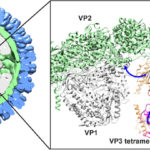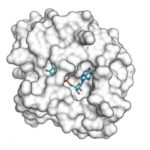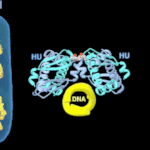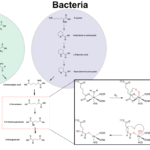Combining cryo-electron microscopy, biochemical assays, and protein crystallography at Advanced Light Source (ALS) Beamline 5.0.2 (part of the Berkeley Center for Structural Biology), researchers from the Baylor College of Medicine discovered that rotavirus VP3 incorporates in one place all the enzymatic activities required to effectively cap rotavirus mRNA, making it unique among viral-capping enzymes.
Building Blocks for COVID-19 Antiviral Drugs Identified in Rapid Study
Members of the UC San Francisco Quantitative Bioscience Institute Coronavirus Research Group (QCRG), in collaboration with Berkeley Lab and SLAC National Accelerator Laboratory (SLAC), have identified key chemical building blocks for an eventual antiviral drug against SARS-CoV-2, the virus that causes COVID-19. The newly identified compounds bind to an enzyme produced by the virus, called the “macro domain,” which is known to be crucial for the virus’s ability to replicate in human cells. The authors are writing up a formal manuscript describing the results for submission to a peer-reviewed academic journal, but also published their data directly online on July 1 to accelerate global efforts to fight the coronavirus pandemic.
Study Gains New Insight Into Bacterial DNA Packing
A Berkeley Lab-led team of researchers used multiple high-powered X-ray techniques at the Advanced Light Source to image the process in E. coli bacteria at the micro-, meso-, and nanoscales. The imaging technique they developed enabled them to visualize the bacteria’s chromosome at higher resolutions than ever before, and without the need for labeling, which slows down the process but is required by most other techniques.
James Holton Named ACA David J. Rognlie Award Winner
James Holton, a faculty scientist in the Molecular Biophysics and Bioimaging (MBIB) Division and full adjunct professor of biochemistry and biophysics at the University of California, San Francisco (UCSF), is the 2020 recipient of the American Crystallographic Association’s David J. Rognlie Award.
Finding the Missing Step of an Important Molecular Process
Lysine is an important amino acid that must be supplied in our diets, as our bodies can’t produce lysine on their own. Most cereal grains have low levels of lysine, and scientists have worked to breed crops with higher lysine levels.
However, the biochemical processes that break down lysine in plants weren’t fully understood. New Joint BioEnergy Institute (JBEI) research, published in Nature Communications, reveals this last missing step of lysine catabolism.
- « Previous Page
- 1
- …
- 7
- 8
- 9
- 10
- 11
- …
- 19
- Next Page »
Was this page useful?








